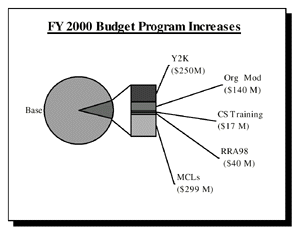|
February 01, 1999
FY 2000 IRS Budget Request
The FY 2000 resource request of $8.105 billion supports the
mandates contained in the IRS Restructuring and Reform Act of 1998
(RRA98), which includes the Concept for Modernizing the IRS proposed
by Commissioner Charles O. Rossotti. This Modernization Concept
calls for serving taxpayers better through service to each taxpayer,
service to all taxpayers, and productivity through a quality work
environment. The concept will shift the focus of the IRS from its
own internal operations to service from the taxpayer’s perspective
by establishing four operating divisions based on clearly
identifiable customer segments.
The President’s Budget and the Congressional Justification serve
as the initial documents to introduce the Congress to the detailed
plan, timeline, and funding requests for implementing RRA98 and the
Commissioner’s Modernization Concept.
Total Budget Request. For FY 2000, the Internal Revenue Service is
requesting resources for the Processing, Assistance and Management
(PAM), Tax Law Enforcement (TLE), Information Systems (ISY), and
Information Technology Investments (ITI) Appropriations that total
$8.105 Billion and 95,767 FTE. This request is only $2 million more
than the $8.103 million in funding provided in FY 1999. In addition,
the IRS is requesting $144 million and 2,095 FTE in funding (an
increase of only $1 million over FY 1999) outside the spending caps
for the Earned Income Tax Credit (EITC) Appropriation.

Budget Increases. The $8.105 billion budget is required to maintain
current 2 services, while investing in critical systems projects and
funding organizational restructuring and reform to modernize
America’s tax agency.
The FY 2000 submission requests the following increases:
Y2K Conversion -- $250 million and 239 FTE to assure continued
operation of IRS’ information systems into the new century.
Maintain Current Service Levels -- $299 million to maintain FY 1999
program levels in FY 2000. The IRS has partially offset this need by
taking base program reductions of $50 million and 580 FTE;
therefore, the net increase requested is $249 million.
RRA98 Implementation -- $40 million and 500 FTE for implementing
RRA98's customer service and electronic tax initiatives.
Enhancing Customer Service through Improved Training -- $17 million
for investing in customer service training to bring customer service
skill levels up to acceptable standards and meet the RRA98 mandate.
Organizational Modernization Concept -- $140 million for
implementing the Modernization Concept to restructure, reorganize,
and re-skill the IRS workforce, including training. These
investments will complement the IRS’s systems modernization efforts
and implementation of the RRA98.

Information Technology Investments (ITI) and the PRIME. In FY 2000,
the IRS is not requesting any additional funds for the ITI
Appropriation. This is possible because the Congress advance funded
the Information Technology Investments account to a level, $506
million, that will sustain the IRS through FY 2000. In FY 2001,
however, the IRS is requesting advance funding of $325 million. On
December 9, 1998, the IRS awarded the Prime Systems Integration
Services Contract (PRIME) to Computer Sciences Corporation (CSC) and
their Alliance partners. In early January 1999, the Commissioner and
the Chief Information Officer (CIO) established the Core Business
Systems Executive Steering Committee to provide IRS-wide strategy
planning and budgeting for core systems replacement, oversee core
business systems modernization, and review and approve major core
systems projects at initiation and key points in the systems life
cycle.
Earned Income Tax Credit (EITC) Funding. The IRS is requesting $144
million and 2,095 FTE. This is the third year for this account,
which is funded outside the discretionary spending caps and shown
separately in the overall Treasury request. The account provides for
expanded customer service and public outreach programs, strengthened
enforcement activities, and enhanced research efforts to reduce
overclaims and erroneous filings associated with EITC.
Previous | Next
1999 IRS News Releases | News Releases Main | Home
| 